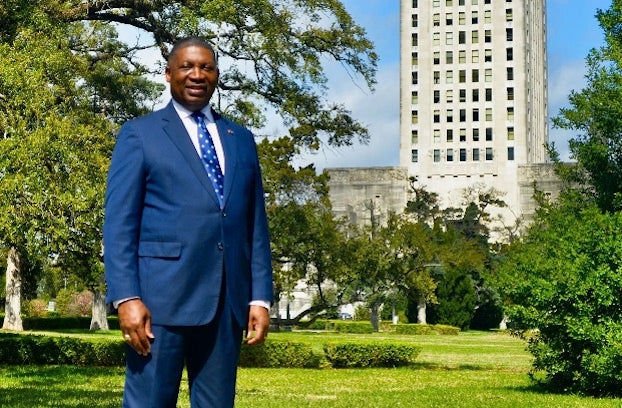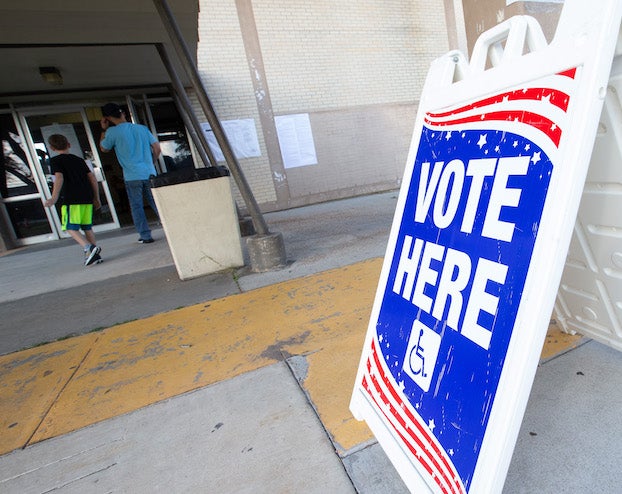Gubernatorial candidate Shawn Wilson: What will make us safer, smarter, healthier and wealthier?
Published 5:41 am Thursday, September 7, 2023

- Democratic gubernatorial candidate Shawn Wilson. (Special to the American Press)
The three most important needs for Louisiana residents are public safety, health care and education — all of which are not protected in the state budget and are preventing the state from breaking the cycle of poverty. Democratic gubernatorial candidate Shawn Wilson said he can fix that.
Wilson, the former Department of Transportation and Development Secretary, has had a 25-year career under four Louisiana governors and has worked across the aisle with both Republicans and Democrats. He said his plan, if elected governor, will be to focus on the issues that “make us safer, make us smarter, make us healthier and wealthier — those are the things that matter most.”
Wilson, speaking to members of the American Press editorial board, said those issues are also codependent on each other.
“When you look at if it’s going to make us safer, whether it’s crime or public safety or resilience, it has a lot to do with education. It has a lot to do with economic opportunity. It has a lot to do with your physical well-being in some cases,” Wilson said. “My approach in addressing all four of those issues is really around sustainable government, meaning we need to be doing things that are fact-based, things that are performance-based, and do it sustainability.”
Wilson said Louisiana suffers because it historically has gone four years or eight years on one political trajectory and then it switches.
“When we switch, we undo the last two to four years, maybe more, so we find ourselves treading water — whether it’s education policy, whether it’s criminal justice, whether it’s health care policy, whether it’s economic development initiatives, you tend to undo and spend time there,” Wilson said. “What we offer is not the same thing as Gov. John Bel Edwards, but many of the same approaches that John Bel had of looking at best practices, following national trends and understanding what’s applicable here and sticking to it.”
Wilson said criminal justice reform “while not perfect, is the beginning of something and if you give it an opportunity to work, you can make refinements and not wholesale changes. You can apply some of those types of criminal justice reforms to juvenile offenders. You can learn from things like re-entry programs to reduce recidivism and increase production and performance. When you look at the unprecedented number of people in prison, I’d much rather have them come out being a taxpaying citizen as opposed to a tax burden on citizens because we have to re-incarcerate them.”
Figuring out what’s working, giving it an opportunity to work while simultaneously looking at intervention and prevention is part of Wilson’s plan.
“On the prevention side, we have to deal with education and making sure our young people can read and that they can be engaged in what we are providing them,” he said. “Go to any prison and do a literacy test and see what you get. You’re going to get, in many cases, the least-performing students in our public school systems or private school systems that have found themselves in a bad situation. They’re being held accountable and that’s an appropriate action, but they don’t have the skills to be competitive and stay engaged in that educational experience.”
Wilson said he will make investments in early childhood education — and not wait until students are in third grade to do so, as other candidates have suggested.
“I support the idea of third grade accountability for reading, but I also think we should be remediating first grade now so when they get to third grade that number is much smaller,” he said. “My fear is you might get 20% of our students held back and that’s going to wreak havoc in our system — for teachers and those families and students in terms of how do you deal with the stigma of failing in elementary school. I remember the stigma of failing in elementary school and how difficult that was on those individuals. They were never in a position to catch up and those were the kids I remember that got in trouble because we took them out, put them somewhere they weren’t comfortable and they were ashamed of that and acted out.”
Wilson said literacy serves as a preventative effort to keep students out of the court system. Shop, industrial technology and auto mechanics classes do, too, while also serving as equalizers.
“We got away from that,” he said. “We went all technology and all STEM and not everybody is capable of doing that. Going back to that is going to be important. It’s going to be an expensive endeavor because you now have to retrofit schools and invest in faculty and curriculum to provide those alternatives, but that is going to feed into that wealthier economy.”
Wilson also supports maintaining Medicaid expansion — not just because it balances the budget, he said, but because it gave 500,000 people benefits and allowed them to take better care of themselves.
“Which means they can work, which means they can take care of their families,” he said.
Wilson said literacy, crime prevention and health care expansion are all interrelated and all contribute to breaking the cycle of poverty.
“My approach is to have sustainable policies that the state can benefit from, i.e., maintaining the 0.45 (state sales tax) not to grow government but to make investments in these types of programs. You can pay teachers with those dollars, you can invest in mitigating insurance increases, you can provide for mental health programming with those dollars, you can build infrastructure, you can build workforce development. If you cut the budget, you still have this mounting pile of public need out there. No one talks about how you address those needs if you eliminate the funding that’s coming in — personal income tax being one.
“I’m not naive enough to say Shawn Wilson becoming governor gets all this done,” he said. “What it does do is it allows us to, on some occasions, stop the extreme and make it not get worse.”
Wilson said he is the most qualified candidate to serve as governor, earning a bachelor’s degree in urban planning and master’s and doctorate degrees in administration and public policy.
“I’m someone who has worked with several gubernatorial executives without the level of scandal or criticism or problems,” he said. “I’m someone who’s from New Orleans but spent the majority of their adult life in Lafayette, which is a different political spectrum. I am not running as the African American candidate, although that is a factor.”
Calcasieu River-Interstate 10 Bridge
Wilson said one of the things he’s most proud of during his tenure as DOTD secretary is addressing the issues that mattered most to Louisiana residents, not creating more projects.
“We said, ‘Let’s look at what people have asked for? Let’s look at what people have paid for?’ We did the Barksdale Interchange, which had been waiting for 25 years. We widened Lake Charles to the state line. We widened the interstate in Baton Rouge and the interstate to Baton Rouge, the airport interchange in New Orleans, the Plaquemines bridge and tunnel. All these projects had been on the books for decades.”
He said replacing the Calcasieu River-Interstate 10 Bridge is a “very complex project.”
“The political wheel to do it has waned and the devastation is going to be the fact that we have assembled, and I’m very proud of this, $800 million of a project that is $2.1 billion that we just cannot afford independently,” Wilson said. “The state is committed to completing the entire project, which is I-210 to I-210 and not just a bridge. You can’t just build a bridge and say everything else stays the same.”
Wilson said the delay cost for one year will add $100 million more to the project.
“It’s going to get more expensive and if you don’t do it in the next seven years, you’re back in the environmental process again,” Wilson said.
He said the Windfall Proceeds Account can be used to reduce toll costs and private activity bonds can help, too.
“Part of that $800 million gives us $40 million a year for seven years,” Wilson said. “You can take that money and eliminate tolls for locals or tell the Department of Revenue to create a shadow toll that reimburses the tolls people pay each year. Surplus windfall can also be added to the account to pay off years from the total cost.”
Wilson said if legislators pull the rug out from under the project, the limited number of contractors qualified to build the bridge may pull out, too.
“The question is going to be why would these companies come back in after spending millions of dollars to compete to come back and do it again? It’s a real issue,” Wilson said. “These companies spent millions to get the opportunity to build this bridge. Contractors aren’t going to stay in Louisiana if you’re not making good business decisions to protect them. No one is going to come if we exercise this attitude. They’re going to say, ‘Man they can’t get their act together.’ ”
He said delaying the bridge could also be devastating for future disaster response needs, and something else to consider is the outcome of an EDC contamination lawsuit.
“We talk about windfall proceeds, if the judge in the EDC spill says you get $100-$200 million, it all goes to reducing the bridge at the end of the day,” Wilson said. “That could knock out five or 10 years of the toll, maybe more, at 25 cents for locals. People forget the interstate system wasn’t built by us. It was built by the federal government and then given to us, but no one gave us the money to maintain it and we don’t have the Eisenhower Act to build it out again.”
ITEP rules
Wilson said he’s the only candidate who has said he will maintain the Industrial Tax Exemption Program changes Edwards made.
“The others say we’re going to keep it 80-20 but they forget about the local autonomy in terms of locals making decisions on giving away their tax dollars,” Wilson said. “Those changes produced about $254 million staying at the local government to pay for things like public roads, public education, public health, libraries. All of them were beneficiaries in places where ITEP worked. None of the businesses that asked for it or didn’t get it, left.”
Wilson said he is the only candidate that’s going to support local governments “to control their own destiny with their own tax dollars that individuals have levied upon themselves and entrusted the locals to make those decisions and not bring it to Baton Rouge.”
He said it’s more than the 80-20, five-year intervals.
“It’s who makes the decision to give away your money.”





